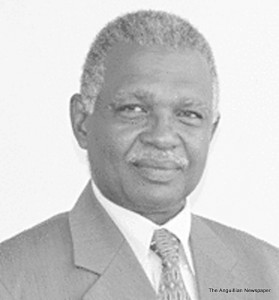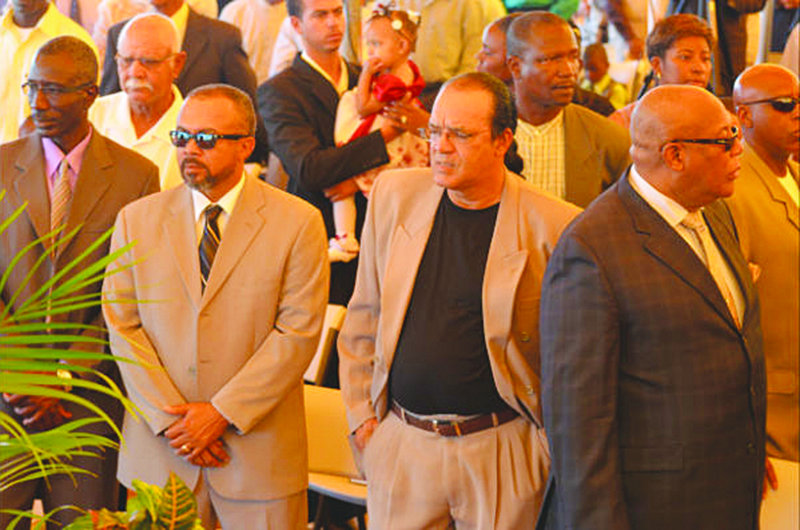
The following press release was issued on Wednesday, February 22, by Deputy Speaker of the Anguilla House of Assembly, the Hon. Leroy C. Rogers:
On February 15th 2012 at a meeting of the House of Assembly I was viciously and wrongfully attacked by the Speaker of the House, Barbara Webster-Bourne from the Chair. All of us are aware that the House is a chamber where debates of national importance take place, and we expect from time to time the exuberance of members will result in tough discussions. However, one would expect that the Speaker, who is the referee of both sides, would uphold the rules of the House, be fair, be professional, do not misrepresent the facts, do not mislead the public, and refrain from attacking members.
Anguillais a democratic country, and these principles must be upheld by the House, and particularly by the Speaker both in and out of the Chair. The actions of the Speaker should reflect the clear guidelines set out in the Constitution, the Rules of Procedure of the House, other Statutory Rules and Orders, and Parliamentary Conventions.
I was attacked personally from the Chair which has done nothing but reduce the office of Speaker to the level of a political attack dog I was refused an opportunity to defend myself and set the record straight. It is a shame that members of the House do not have the privilege of responding to allegations made against them in the Anguilla House of Assembly by the Speaker. Each citizen has the right to defend himself accorded by the Constitution. It would seem that the Constitution applies everywhere except in the House of Assembly. This is what the operations of the House have come to inAnguilla; members are denied their right to respond as the Chair lauds its power in an undemocratic and unprofessional manner. It is being run like a dictatorship. So I have to resort to this medium to present the truth of the situation to the members of the House and the public.
If a Speaker is concerned about comments that were attributed to a member it is incumbent upon them to seek clarification from that member on the matter in a level-headed and professional way.
The Speaker used her privilege in the House to once again usurp the power of the Chair on February 15th, 2012. Under the agenda section entitled “Announcements by the Direction of the Speaker” she proceeded to level an allegation that I went “on public broadcasting media with respect to the last sitting of the Anguilla House of Assembly that took place on January 16th, 2012 in which the Vehicles and Road Traffic Amendment Bill was debated in its second and third readings of which he said I had no right of opinion.”
Firstly, the allegation that I went to the media is absolutely wrong. I was contacted by Radio Anguilla, because of my experience and knowledge of the rules of the House, and was asked if the Speaker was right to be giving her opinion on whether a section of the Vehicles and Road Traffic Amendment Bill should be further amended. This amendment was already on the floor being debated by members, in Committee Stage, and it related to the reduction of a fine to a lower level. I was informed by Radio Anguilla that the Speaker gave her opinion on reducing the fine and further indicated how she would vote on the matter.
I believe I have a right to educate the public on the procedures of the House, as I have done for almost twenty (20) years. My response to Radio Anguilla was that the Speaker’s role, among others, is to convene meetings, preside over the meetings, enforce the rules fairly, and not get involved in debate while Assembly is in session or in committee. My opinion, even after her tirade in the House, remains the same, and I will always give my opinion when asked.
In defence of her position that she has the right and authority to take part in debate in the House of Assembly the Speaker quoted Legislative Assembly Procedure Rules 1976 Section 55 (2) a, Section 2 (g), and Section 53 (2) of the Anguilla Constitution Order 1982. She also indicated that based on these sections she can refuse or accept such amendments as put forth.
Anybody who uses these provisions to justify the Speaker’s position on this matter is either unaware of the details of the sections she quoted as giving her this authority, or is deliberately attempting to mislead the public in this matter by misinterpreting the said provisions.
In fact, I challenge the Speaker to release the advice of the Attorney General in its entirety with regard to the matter at hand. Through vague reference she implied that her position was supported by the Attorney General. In the furtherance of transparency I suggest that if indeed this is the case, then there should be no problem releasing the document.
Section 55 (2) g of the Rules of Procedure states: “The Speaker or presiding member may refuse to put an amendment which is in his opinion frivolous.” That is the extent of the Speaker’s involvement in the amendment. This amendment was not frivolous, it was not deemed by the Speaker to be frivolous; therefore it was up to the members to decide on the matter not the Speaker. Her opinion on this matter was not appropriate. It could be construed as being biased, and can never be justified.
Section 55 (2) a states: “In settling a bill in Committee any member may move an amendment or, without making a formal motion may suggest an amendment or, may ask for information respecting any part of the bill or any proposed amendment.” It is obvious that the Speaker is of the opinion that she is a member of the House of Assembly. She is not a member of the House, and her opinion that she is a member has been the crux of numerous issues and problems over the last two years.
Section 53 (2) of the Constitution states: “The Speaker or other member presiding shall not vote unless on any question the votes are divided equally, in which case he shall have and exercise a casting vote.” It is still amazing to me how this provision grants the Speaker authority and the right to enter debate and give an opinion on the amendment on the floor. At no time when this matter was in Committee was a vote called on the amendment which resulted in a tie. Only this eventuality would then necessitate a casting vote by the Speaker, and even then she should vote to maintain the status quo. This is the convention of using the casting vote. It is so designed because the Speaker is not a legislator and should not be making new law unanimously, but rather should give it a chance to be brought back to the House by the people’s representatives.
For the avoidance of doubt the Speaker is not a member of the House. The Anguilla Constitution in Section 35 (2) b, c and d sets out the members: two ex-officio members, namely Attorney-General and Deputy Governor, seven members elected by law, and two nominated members appointed by the Governor. There are no other members of the House. The office of Speaker is established under Section 35 (2) a of the Constitution which is totally different from a member as established in the section mentioned above. Section 50 (5) clearly indicates that the Speaker presides over the House. I challenge The Speaker to indicate the section of the Constitution where the Speaker is referred to as a member of the House.
In the role as presiding officer the Speaker should always be neutral and treat both sides of the House fairly. It is important that the Speaker must also be perceived to be neutral. To achieve this he or she must relinquish all political offices, should not be attending or chairing party meetings, should not be taking directions from the political directorate, refrain from supporting the opinion of one side over the other (even in giving opinions on amendments on the floor), should not let one side ramble and interject irrelevant matters into the debate while shutting down the other side, and must defend the rights of the minority. It is important to note that if these are not done then a Speaker will not be perceived as being neutral and independent.
A Speaker is the Speaker of the whole House: Government, Opposition, Nominated and Ex-Officio Members. A Speaker must divorce himself/herself from political influences. A Speaker should study and understand the rules, practices, conventions, principles, laws and constitutional provisions that pertain to the office of Speaker and the operations of the House of Assembly, and enforce them fairly.
The Speaker made a reference to my tenure as Speaker of the House of Assembly. I can categorically state that during my tenure I did not refuse to sign bills that were duly passed by the House, I did not withdraw bills from the floor without the consent of the members of the House, and I never ignored advice from the Attorney General with regard to proper parliamentary procedure and conventions. In fact, all of my actions while I was Speaker can withstand judicial scrutiny in any jurisdiction in the Commonwealth.
I would encourage any Speaker to be familiar with Erskine May’s “Parliamentary Practice” published in 1844, with its latest edition of June 30th, 2011 now available. It is sometimes called the Parliamentary Bible for the entire family of Commonwealth parliaments.
I am not afraid to voice my countervailing position to either the Speaker or the political operatives who have engaged me on this matter since the last sitting of the House of Assembly. I served as Speaker of theAnguillahouse of Assembly for 11 years, I served as a member of the executive committee of the international Commonwealth Parliamentary Association for 3 years, and I served as President of the regional branch of the commonwealth Parliamentary association (CPA). I gained invaluable knowledge and exposure from these experiences. I will educate the Public whenever and wherever I am called on to do so.
(Published witohut editing by The Anguillian newspaper.)








